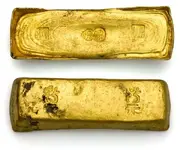And like mentioned above "Asset forfeiture(?)" is real. I know of an 80 something year old man that lost everything from a stupid business mistake and not keeping up with the laws. His Grand kids will be battling it in court. So..You don't just risk what you may find, you risk it all!! He has to prove where everything he owns came from, Gun collections, watch collections, coin collections, etc.... You can't prove 60 years of some collections and where every piece came from . it's impossible. He may have been better off burying gold,silver, or cash! Then he wouldn't have lost it all even when 99% of it was obtained legally. I say 99% because it's almost impossible to keep up with laws sometimes depending on what you are doing.
There are no bigger thieves than governments amigo. That is why the trio have diverse interests in many projects scattered all over the globe. ( remember the old saying never keep all ya eggs in one basket?)
I have a yarn to tell you. About a very successful treasure hunter that was screwed over by successive governments.
Captain Michel Hatcher is the explorer and marine salvage expert who made arguably the two greatest shipwreck cargo discoveries of Chinese porcelain and other wares in the South China Sea: the Nanking cargo of the early 1980s and the Tek Sing cargo of more than 360,000 pieces in 1999.

Born in Yorkshire in 1940, Hatcher was a Barnado’s boy from the age of two to 15 years old. He was taken to Australia at the age of 13 where he discovered a passion for the sea after being introduced to sailing in his late teens.In his early twenties he decided to leave a career in farming to become an engineer, and by 1981 he had started his own salvage company which enjoyed success with the discovery of the Nanking treasure in 1987 and the Tek Sing cargo in May 1999.

A number of controversies surround the salvaging of historic wreck cargo undertaken by Michael Hatcher. The salvaging of both the
Tek Sing and the
Geldermalsen have been heavily criticized by archaeologists for stripping archaeological sites of valuable artefacts without recording any context and destroying the less economically valuable parts of the assemblage, such as the ships themselves. Because of his success in recovering treasure he became a target of envious academia.

However at the time he had an signed a legal business agreement with the then powers to be in Indonesia. However the Indonesians got smart although he shared the treasure recovered with the old Indonesian government. And technically his share was his. He could not legally move the artifacts out of Indonesia set by new legislation by the new Indonesian government. So in effect he was left with treasure and no buyers with in Indonesia.
However he was forced to secretly remove his share of treasure under the fear the new Indonesian government was drafting news laws to protect underwater heritage and use that new legislation back dated, to take his share from the original agreement.. During this transition period he was prevented in taking anymore artifacts out of the country. Whats was already out the country was being sold raising many millions of dollars at Christies and various other auction houses.
Then came along the Australian government eager to sign a trade deal with Indonesia who lobbied as part of the deal in the trade agreement, was to return cultural artifacts that under an international Agreement Australia was assignee of. Since Michel Hatcher was an Australian citizen living on the gold coast.
So was raided by Australian Authorities.
Seven containers of the
Tek Sing cargo were seized by Australian authorities pursuant to their Protection of Movable Cultural Heritage Act 1986 as the New Indonesian government had confirmed that they had been illegally exported from its territory.This confirmation came too late for much of the cargo however, and it was able to continue its journey and be sold at auction in the EU. On 12 September 2001, the 71 939 seized ceramics were returned by Australia to Indonesia.
So regardless of the legal agreement Hatcher had with old government of Indonesia, to the new Indonesia government in power it was worthless, as they deemed it a deal of the old government and not theirs. His own Australian government who wanted a trade deal was eager to enforce Protection of Movable Cultural Heritage Act 1986 to appease the new Indonesian government to get a trade deal.
So technically we have a Country selling out its own citizen who had a legal agreement and entitlement to treasure recovered from his services.Because of other vested interests.
This is not uncommon amigos.
That is why you have to be 3 steps ahead of the game.
Crow







